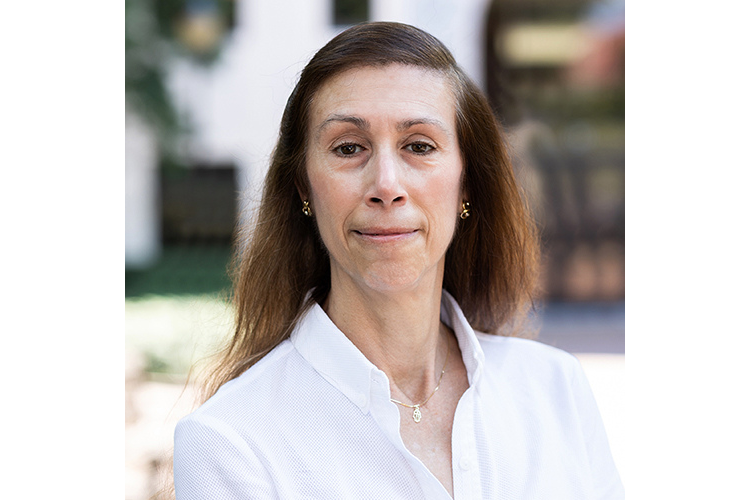Meet the Tam Institute’s Interim Director, Prof. Hazel Gold

Dr. Hazel Gold, Associate Professor of Spanish, was appointed the Judith London Evans Interim Director of the Tam Institute for Jewish Studies on August 1, 2024.
How do you envision TIJS’ role during the coming year?
As I pick up the leadership reins from TIJS director Miriam Udel, who is currently on leave, I hope to build upon the work she has done to orient the Jewish Studies program in new and exciting directions that engage our students, respond to recent trends in Jewish Studies scholarship, and serve as a resource for the Emory community and beyond. I will be working to promote to our many constituents – faculty, students, staff, Emory administration, alumni, and community members – the role that TIJS plays as a vibrant academic and intellectual hub.
What are you most looking forward to about serving as the Judith London Evans Interim Director?
First, I hope to get to know better our diverse cohort of JS students and connect with them on a personal level. I’ll be breaking bread with many of them at our Fall welcome dinner, joining them on a walking tour of Jewish Atlanta led by curator Joel Silverman of the Breman Jewish Museum, and attending an upcoming performance by the Ethiopian Israeli spoken word artist-singer-rapper Orit Tashoma, who is a visiting artist in residence by the BAMAH Foundation this semester. Similarly, although I have been a core member of TIJS for some time and have previously filled the role of interim director, I’m eager to be in more sustained conversation with Tam faculty colleagues about their work and the future directions in which Tam will be moving. I’m eager to follow the progress of a pilot working group, under Prof. Eric Goldstein’s able leadership, which we hope will lead to the creation of a virtual center for advanced Jewish Studies, bringing together an interdisciplinary cohort of scholars from Emory and other universities who will meet regularly in online seminars and at an in-person conference on campus. Once the center is established, each iteration of the seminar will vary; for the pilot version, planned for Fall 2025, the theme will be “Jews and Race.”
What upcoming TIJS events are you most excited about?
I’m especially looking forward to TIJS’ two signature events: the annual Fall semester Rothschild lecture and the Tenenbaum Family lecture in the spring. This year the Rothschild lecture, scheduled for Oct. 29, will feature Prof. Sigal Ben-Porath of the University of Pennsylvania. Her lecture is titled “Campus Speech About Jews After Oct. 7.” As we approach the one-year anniversary of what occurred that day, Ben-Porath’s topic could hardly be more timely, especially in light of the turmoil on college campuses last spring. Looking ahead to Spring semester, I’m excited that TIJS will be hosting the annual conference of the Holocaust Education Foundation of Northwestern University (HEFNU), which will bring an interdisciplinary cohort of scholars to campus to share their research. Visiting Assistant Professor Alicja Podbielska is organizing this conference. The Tenenbaum lecture will take place during the gathering and will focus on a related topic. Holocaust denialism continues to pervade the public sphere, most notably through online media. It is urgent that we study how Holocaust education can address this, especially as the number of survivors dwindles.
What are your primary areas of research? When and how did you first become interested in these particular areas?
I hold a PhD in Romance Languages from the University of Pennsylvania; my doctoral training was centered on the literature and culture of modern Spain from the late 18th century to the present. My principal focus has been the so-called uneven modernity of 19th-century Spain as reflected in cultural production including novels, theater, and journalism. The 19th century represents the moment when nationalism and the study of history as a scientific discipline both came to the fore. I became interested in exploring how Spain’s creative authors, historians, and public intellectuals addressed Spain’s illustrious Jewish legacy prior to the Expulsion of 1492 while promoting a vision of Spain’s national identity as distinctively Catholic. Subsequently, I’ve expanded my focus to explore the status of Spain’s Jewish community in the 21st century: for instance, their representation in Spanish film and television and relationship with the State, including the law that for a period (2015-2019) allowed all Jews of Sephardic descent to apply for Spanish citizenship. As my interest in these questions has grown, I’ve also done a deep dive into Ladino and the current revival efforts underway to preserve and cultivate this language. I share these research interests with students in classes that I teach about Jewish Spain and Latin America. Last year I taught a first-year seminar (Mazel Tov, Amigos) about Latin American and Latinx Jews; currently, I’m teaching an advanced seminar (Matza and Tortillas) that covers the Jewish presence in early modern and contemporary Spain as well as Latin America.
What other kinds of activities do you enjoy?
I’m a film devotee and over the past decade have served several times as co-chair of the Film Evaluation Committee of the Atlanta Jewish Film Festival. Through this work I’ve had the opportunity to screen hundreds of films from the US, Israel, and elsewhere. This has been enormously entertaining and often provocative work. The ability to understand and critique film is a skill that has also served me well in my teaching, as films are included in nearly all the courses I offer. Another interest of mine? Collecting cookbooks and expanding my repertoire of dishes representing global cuisines. Finally, I’m a Wordle addict! My longest streak was 86 consecutive puzzles solved, broken only when I traveled to Europe for a conference on an overnight flight and forgot to play that day’s game.
Published 9/25/24